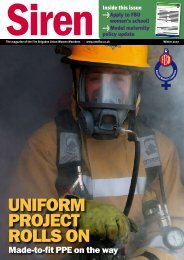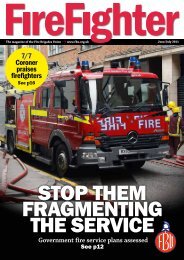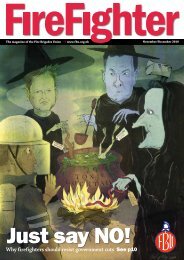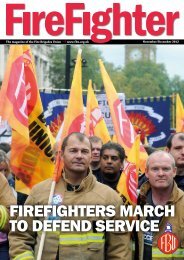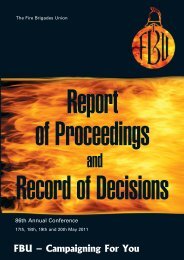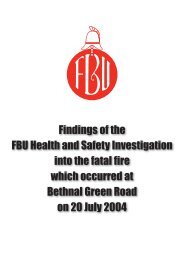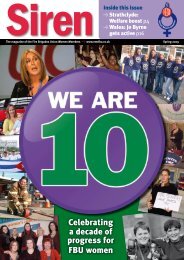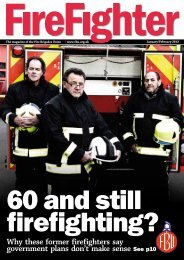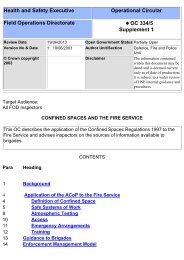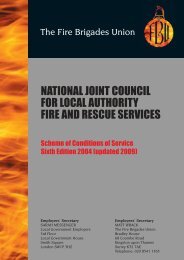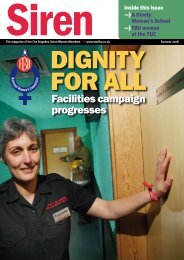Report - Fire Brigades Union
Report - Fire Brigades Union
Report - Fire Brigades Union
You also want an ePaper? Increase the reach of your titles
YUMPU automatically turns print PDFs into web optimized ePapers that Google loves.
SECTION H — EDUCATION<br />
●<br />
●<br />
●<br />
●<br />
consider how the union might develop strategies for<br />
building an effective organisation at all levels in order to<br />
protect the interests of the membership;<br />
think about the relevance of political ideas in pursuit of<br />
trade union objectives such as fair and equal treatment;<br />
discuss how to tackle racism and challenge far right ideas<br />
in the workplace; and<br />
understand the broader trade union and labour movement,<br />
both national and international, and factors affecting its<br />
development, both now and in the past.<br />
As outlined above, the school was delivered to two groups in<br />
Year 1 and one group in Year 2. A range of discussion activities<br />
was supported by inputs from both tutors and guest speakers.<br />
The school included separate programmes of study for Year 1<br />
and Year 2. The programme of work for Year 2 was built on the<br />
assumption that learners have previously covered the work of<br />
the first year. All students were sent written pre-course reading<br />
covering both study skills and issues to be discussed during<br />
the school.<br />
The school was opened on Sunday afternoon by Sean<br />
Starbuck, national officer, and Trevor Cave, director of<br />
education. Participants then divided into their respective<br />
classes in either Year 1 or 2 for introductory sessions with<br />
their tutors and class chairs. The sessions covered an<br />
introduction to studies and a discussion of learning aims,<br />
methods and skills.<br />
On Monday the school was opened by Matt Wrack, general<br />
secretary, who introduced a session entitled “Defending<br />
quality public services and the fire and rescue service – new<br />
challenges with a new government”, followed by a question<br />
and answer session. The school then broke into group<br />
sessions to further develop the discussion.<br />
After lunch the school met again in plenary session for an<br />
introduction by Trevor Cave, FBU director of education, on<br />
“The National Joint Council for local authority fire and rescue<br />
services – understanding and defending the NJC; knowing and<br />
using your agreements”. This was followed by Year 1 group<br />
discussions on understanding the NJC and Year 2 considering<br />
national and local campaign priorities.<br />
The penultimate session of the day for Year 1 was introduced<br />
by Sean Starbuck who delivered a briefing for the next day’s<br />
visits to the National Coal Mining Museum, the exhibition of<br />
banners and the 25th anniversary of the miners’ strike 1984-85<br />
at the NUM headquarters, Miners’ Hall, in Barnsley, and the<br />
Huskar pit disaster memorial in Silkstone churchyard.<br />
The penultimate session of the day for Year 2 was introduced<br />
by Trevor Cave who delivered a briefing for the next day’s visit<br />
to the Wilberforce House Museum in Hull.<br />
On Tuesday Year 1 visited Silkstone churchyard where<br />
participants were given the opportunity to view the Huskar pit<br />
disaster memorial of 1838. The group then proceeded to the<br />
National <strong>Union</strong> of Mineworkers headquarters in Barnsley<br />
where they were met by officials from the NUM who gave a<br />
talk on the exhibitions and the hall itself. This was followed by<br />
a visit to the National Coal Mining Museum where participants<br />
went on an underground tour to see for themselves the<br />
conditions that prevailed in the mining industry and to put the<br />
visit to the memorial and the miners’ hall in context.<br />
Year 2 made a visit to the Wilberforce Museum in Hull where<br />
they were given the opportunity to discover the history of the<br />
slave trade and the campaign to have it abolished. Participants<br />
also had the opportunity to examine the modern trade in slaves<br />
and make comparisons. This visit was a departure from<br />
previous years and, along with the visit to the mining museum,<br />
was hailed as a great success.<br />
On return to Wortley Hall the groups prepared presentations<br />
on their respective visits. These presentations were in<br />
response to activities around the themes of the visits and were<br />
to be presented in plenary session on day five.<br />
On Wednesday the morning started with a contribution<br />
entitled “Trade unions and contemporary employment<br />
relations – understanding what’s happening today”, given by<br />
guest speaker Professor Gregor Gall from the University of<br />
Hertfordshire. This was followed by a question and answer<br />
session before the school broke into groups for the<br />
classroom activities. Year 1 concentrated upon attacks on<br />
trade unions whilst Year 2 looked at dealing with hostile<br />
employers and management. Gregor Gall joined the group as<br />
guest tutor.<br />
At lunchtime all participants gathered on the steps of Wortley<br />
Hall for the traditional group photograph.<br />
The afternoon commenced with a lively plenary session led by<br />
Colin Burgon, retired Labour Member of Parliament for the<br />
Elmet constituency 1997-2010 and member of the FBU<br />
Parliamentary Support Group. The session was entitled<br />
“Understanding the current political situation” and was<br />
followed by group work developing the same theme.<br />
The final session of the day was the international session<br />
“Defend the rescuers – attacks on medics in Gaza”, led by<br />
guest speaker Sharyn Lock from the organisation Access for<br />
Peace. Sharyn gave a brief introduction followed by a<br />
sometimes harrowing film on her visit to Gaza, followed by a<br />
question and answer session.<br />
On Thursday the school opened with a plenary session led by<br />
guest speakers Alan Freeman and Bob McKee, entitled<br />
“Providing quality public services: what they cost and why we<br />
need them – countering myths and propaganda”. The groups<br />
from both years then went off to prepare for radio interviews<br />
on the government cuts to public services before returning for<br />
a plenary session where they gave their interviews.<br />
The afternoon plenary session on “Race and trade unions”<br />
was led by Dr Brian Kelly, director of the After Slavery Project,<br />
Queen’s University, Belfast. This was followed by questions<br />
and answers before splitting into groups to consider how best<br />
the FBU can go about building unity in the workplace.<br />
FBU Annual <strong>Report</strong> 2011 143





